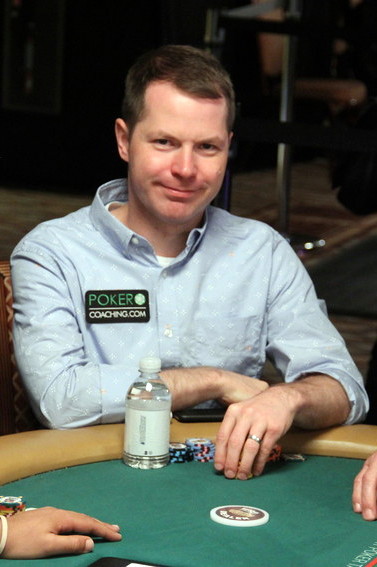






Poker Strategy With Jonathan Little: A Colossal Mistake In A Micro-Stakes GameDevelop Your Poker Skills And Learn How To Crush Games At PokerCoaching.com/CardPlayer |
|
|

Jonathan Little
Not everybody plays for high stakes. I was recently told about a hand by a micro-stakes recreational player that illustrates a few mistakes that many players make on a regular basis. If you work hard to develop fundamentally sound strategies away from the table, you will not make these mistakes in game, resulting in the money flowing in your direction.
In a 5¢-10¢ no-limit hold’em cash game with $17 effective stacks, the players in first and second position, as well as the hijack, limped. Our Hero decided to raise to 35¢ with 7 7
7 .
.
If Hero is going to raise, he should raise much larger. By making it 35¢, he is going to frequently get called by all the limpers, resulting in him seeing a flop with what will usually be a marginal underpair. He may also sporadically get limp/three-bet by one of the limpers, forcing him to fold.
I would much prefer Hero limp behind, allowing him to try to flop a set for the absolute minimum. There is really no point in raising, unless…
Another reasonable line would be to raise to about 85¢, which will usually either steal the pot before the flop or result in only one player calling, allowing Hero to play a pot in position with what will often be the best hand.
A bit to my surprise for games this small, only the small blind and the second limper called.
It is worth noting that when you limp and someone raises to only a small amount more, you should call and see the flop with most of your range. The only hands that make sense to fold are uncoordinated, reverse implied odds hands like A 6
6 and K
and K 7
7 , but those should not be limped to begin with.
, but those should not be limped to begin with.
The flop came Q Q
Q J
J . Everyone checked to Hero, who bet 75¢ into the $1.35 pot.
. Everyone checked to Hero, who bet 75¢ into the $1.35 pot.
 As more players see the flop, you should tend to play in a more straightforward manner because it is more likely that someone connected with the board. Especially when the board contains two high cards, Hero should proceed with caution.
As more players see the flop, you should tend to play in a more straightforward manner because it is more likely that someone connected with the board. Especially when the board contains two high cards, Hero should proceed with caution.
This is a prime example of a spot where Hero should either check or bet small, perhaps another 35¢. By betting 75¢, when Hero gets called, you can be certain he is against either a better made hand or a strong draw that will fare well against his sevens. I would have checked with the intention of folding to any turn bet.
Only the small blind called, and the turn was the 8 . The opponent checked and Hero bet $1.50 into the $2.85 pot.
. The opponent checked and Hero bet $1.50 into the $2.85 pot.
This bet makes no sense at all. The opponent could easily have a queen or 10-9 that will never fold. The opponent will also be unlikely to fold a jack or even an eight (which will usually have a gutshot straight draw to go with it) to this reasonably-sized turn bet.
I do not see a reason for Hero to turn his hand into a bluff, although I suppose he could make a sizable river bet to try to make the opponent fold all hands worse than trips, but even that may be optimistic.
The opponent called, and the river was the J . The opponent bet $4.50 into the $6.35 pot.
. The opponent bet $4.50 into the $6.35 pot.
I generally dislike the opponent’s lead because it makes it impossible for Hero to bluff, and if you think about the opponent’s range, there should be very few bluffs except K-10. The opponent should almost certainly check his entire range, giving Hero the chance to bluff.
Hero made an easy fold.
While this hand may seem standard to some, in my eyes, Hero lit $2.25 on fire. In a 5¢-10¢ game, that is 11.25 big blinds, which is a hefty, completely unnecessary loss.
Hero should have instead limped behind, failed to flop a set, and conceded the pot. Just because your hand is normally decently strong does not mean that you have to pile money into the pot on all betting rounds. Especially if your opponents tend to be calling stations, the best play is usually to make a strong hand and then pile your money in when you are a substantial favorite. ♠
 Jonathan Little is a two-time WPT champion with more than $7 million in live tournament earnings, best-selling author of 15 educational poker books, and 2019 GPI Poker Personality of the Year. If you want to increase your poker skills and learn to crush the games, check out his training site at PokerCoaching.com/cardplayer.
Jonathan Little is a two-time WPT champion with more than $7 million in live tournament earnings, best-selling author of 15 educational poker books, and 2019 GPI Poker Personality of the Year. If you want to increase your poker skills and learn to crush the games, check out his training site at PokerCoaching.com/cardplayer.
